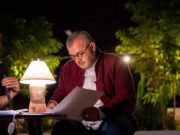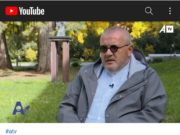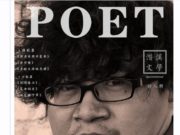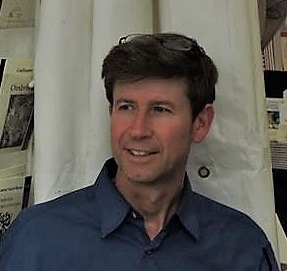Coming from Nyon in western Switzerland, Rolf Doppenberg is a nomadic writer. Besides numerous trips he settled down in Hong Kong, Morocco, Greece and Germany. His writing, mainly poetry and travel prose, explores groundwater territories; each of his books is linked to the place where it was written : the Rhine in« Le songe du fleuve » (« The dream of the river ») in 2011, the city of Athens in« Garrigueurbaine, Eκεί θα φυτέψωτοΔέντρο, 12*2*2 » (« Urban scrubland, That’s where I’ll plant the tree ») in 2012 or the region of the Lake of Geneva in« Uriance » in 2014,three books published by « Le Miel de l’Ours »in Geneva. His new book « Amay Rue Paireuses»was written inAmay in the Maas Valley and published in« L’Arbre à Paroles »publisher, Amay, Belgium, inApril 2016.He contributed to collective works: « 4433: anthology of contemporary French-speaking sonnetsof Switzerland » and « Pantone 40 ». He was invited to many festivals, including « Poésieen Ville » (« Poetry in the City ») in Geneva in 2012 and 2014, « Le Printemps des poètes » (« Spring of Poets ») in Paris in 2013, the « International Poetry Festival Wallonie-Bruxelles » in Namur in 2014 or the « Festival international depoésie de Nador » (« International Poetry Festival of Nador ») in Morocco in 2016.In November 2013 and April 2016, he was writer in residence at the « Maison de la Poésied’Amay » (« House of Poetry of Amay ») in Belgium.
First word
Jerusalem, at dawn
My first word was made of dawn
made of light after the night,
light before the day.
Voice of the olive tree, with the rough bark.
Voice of the hooded crow. Rough its call.
And the silent voice of that woman
sitting at the foot of the rock.
(excerpt from « Sel de nos veines » (« Salt of our veins »), Maelström éditions et Éditions des Sables)
In French (original version):
Première parole
Jérusalem, à l’aube
Ma première parole fut d’aube.
De la lumière d’après la nuit, d’avant le jour.
Voix de l’olivier, à l’écorce rêche.
De la corneille mantelée. Rêche son cri.
Et celle, silencieuse,
de cette femme assise au pied du rocher.
(extrait de « Sel de nos veines »,
Maelström éditions et Éditions des Sables)
Shtatë takimet në Kosovë :
In thankfulness to Fahredin Shehu
and the International Poetry Festival in Rahovec
Seven encounters in Kosovo
“Të gjithëve na mungon
ngapak Kosova”
“A nous tous nous manque
un peu la Kosova »
Ali Podrimja
in « La flamme volée »
First encounter
The plane coming from Zurich, heading to Pristina, was arriving in the airspace of Kosovo, after having flown above the Alps and along the shore of the Adriatic Sea.
The route was given by the video displayed in the cabin.
I looked through the window, and at once I saw large columns of cloud above the mountains of Kosovo; each of those columns was clearly there on its own, like standing in the air, firmly, quietly. I gazed at them, and had a striking feeling; those columns of clouds were the first beings of Kosovo which I encountered. I looked at them more intensively, and I felt like they were greeting me, with their large white body. And all of a sudden, I understood: they were the souls of the dead people of Kosovo, standing there in the high atmosphere, watching over the land, and welcoming the traveler.
Second encounter
Two shining faces, two radiating hearts: Fahredin Shehu and Qazim Cana : there they are at the airport of Pristina, two men full in life; two hugs as a double welcome, hugs of a deep welcome : those first two hugs contain all the coming hospitality of the whole festival.
Third encounter
We’re heading to Rahovec, Qazim driving, Fahredin talking with me; we talk about Ali Prodrimja, the poet of Kosovo who died a couple of years ago. He was a close friend of Fahredin, who tells me about the circumstances of his death. And all of a sudden appears just before the front window of the car, coming from the right side as swift as a bird can be, a hoopoe bird: it gives a good stroke with its wings to avoid the car and flies away to left. Would it be the soul of Podrimja, welcoming the poet with his fine colored feathers, with his accurate flight?
Fourth encounter
We are sitting in the very old courtyard close to the tekke of the Bektashi in Gjakova. On one of the wooden columns supporting the upper gallery surrounding the courtyard, there is an inscription in Arabic letters. We are sharing a meal of Kosovo specialties, talking quietly, Fahredin translating from the Albanian. Two friends of Fahredin, a couple living in Gjakova, join the table: Filloreta and Blerim. They do read poetry, enjoy reading. Their smiles are shining so strong that they touch me directly in my breast. Two smiles of Gjakova, bearing in them the open hands of Kosovo.
Fifth encounter
She is sitting in the garden of the hotel in Rahovec. Dark hairs, a glance full of wit in her eyes. Besa Hoxha. Shaking hands is the beginning of a deeper encounter, an encounter of words, encounter of languages. We work together on a translation of poem into her mother tongue, Albanian. Speaking of every word, approaching every sentence, trying to find a way to say it in the host tongue, in the welcoming tongue, Albanian. Slowly, patiently, the translation grows, finds its shape in the new language; when it is accomplished, Besa reads it: the poem sounds in its new language, and feels well.
Sixth encounter
A joyful music comes from the street, calling all around. I cannot resist responding to the call, go down the street, led by the music: the orchestra is walking to the city Park of Rahovec, loud drums and crying fiddlers. Before it a procession of girls in traditional red and white costume of Kosovo, bearing baskets of grapes on their heads. I follow them until the park, where they settle under a large tree. And then one of the girls comes to me spontaneously, and offers me a rose. The rose of Rahovec.
Seventh encounter
The wine and poetry festival of Rahovec offers such a plenty of encounters, meeting faces, meeting voices, far too numerous to evoke them here. Faces of people listening to poetry, voices of poets from here, from abroad, from near, from far away. So here let the seventh encounter be a multiple one, bearing in it all those faces, all those voices meeting together, in happiness, in peace. In the country of Rahovec, where the grapes ripen on the sunlit Balkan slopes, where the wine matures in the darkness of the barrels, let it offer the gentle drunkenness of words being invented, of words being shared.
Rolf Doppenberg
Rolf Doppenberg- Switzerland- Germany


















